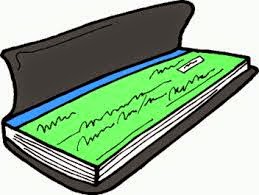Cash, Check or Credit? continued....
Does your business accept cash, credit
cards and checks? As a business owner, you need to be smart about how you
handle these transactions. Learn about how you can manage these transactions in
our three part article series from the Small Business Administration.
__________________________________________________________________
ACCEPTING
CHECKS
 involved with card payments are not ideal for all businesses. If you want to
expand your customer payment options beyond cash but aren't ready to make the
leap to card payments, accepting checks is another option to consider, but to
protect the financial health of your business, make sure you understand the
laws that regulate check payment policies.
involved with card payments are not ideal for all businesses. If you want to
expand your customer payment options beyond cash but aren't ready to make the
leap to card payments, accepting checks is another option to consider, but to
protect the financial health of your business, make sure you understand the
laws that regulate check payment policies.
Policies
for Accepting Checks
If your business accepts personal
checks, establish a detailed check acceptance policy to help identify and
avoid bad checks. Don't just make a document and file it away--be sure to
train your employees on the new policies and post reminders in
visible and prominent locations.
Common check policies include
variations of these guidelines:
- Checks must be from a local or in-state bank
- Checks should not be written and accepted for more than the purchase amount
- Checks should not be accepted that are starter checks, unnumbered checks, or non-personalized checks
- Accepted checks should be deposited as quickly as possible. Banks may refuse to honor checks dated back six months or more
- Instruct your employees to carefully examine every personal check for information that is essential for chasing the check:
o Personalization
- The customer's complete name and address must appear on the check
o Date
- The check date must be current. Do not accept post- or
future-dated checks
o Bank
I.D. numbers - The check must have a bank identification number, or routing
transit number, that runs across the bottom, along with the customer's account
number and check number. This information is used by a
bank to identify the transaction and resolve payment issues
o Payee
- The "Pay to the Order of" section must indicate your business's
name
o Dollar
amounts - Both the written and numeric amounts must match
o Customer
Signature - The check should be signed in your presence and verified with photo
identification
Verifying
Verifying identification can help
your business safeguard against fraud. However, some state laws
regulate which forms of identification businesses can require to
see. Depending on your business location, it may be illegal to require
customers to show a credit card as a condition for accepting their check.
Commonly accepted forms of identification often include a state-issued
driver's license, I.D. card, or military I.D.
Follow these tips when verifying
customer identification:
- Make sure the signature on the customer's identification matches the signature on the customer's check
- Use discretion when recording personal information like phone numbers, identification numbers and expiration dates
- Trust your instincts and be on the lookout for suspicious behavior or fraud "red flags." For questionable transactions, call the customer's bank to verify legitimacy of a check
Bounced
Checks
What should you do if a check is
returned because a customer's account is closed, or has insufficient funds to
pay for the transaction? In addition to instituting a check
policy, some new businesses are employing the help of electronic check verification
companies to identify flagged individuals. For a monthly
fee, businesses can compare a customer's name against a database of
individuals that are known to have written bad, stolen or forged checks.
Even with precautionary measures in
place, businesses that accept checks may still have a bad check
occasionally slip by. If a check fails to clear on your first
attempt, your bank will generally attempt a second deposit. In
some cases, the customer can quickly resolve the problem
by transferring or depositing funds to cover a bounced check. If the
issue is not resolved by the customer, you can consult your
local law enforcement agency to understand your rights and options. Some states
require businesses to mail a registered letter and allow a designated
waiting period to lapse before further action is taken.
If the issue remains unresolved,
consider filing a suit with a small claims court or employing a collection
agency to resolve the payment. Many businesses choose to employ a collection
agency to avoid a lengthy and expensive court settlement.
Dissatisfied
Customers
Occasionally, you'll find a customer
has stopped payment on a check if they believe the products or services bought
did not live up to expectations. If this is true,
customers may be entitled to a refund or a reduction of the
amount owed.




